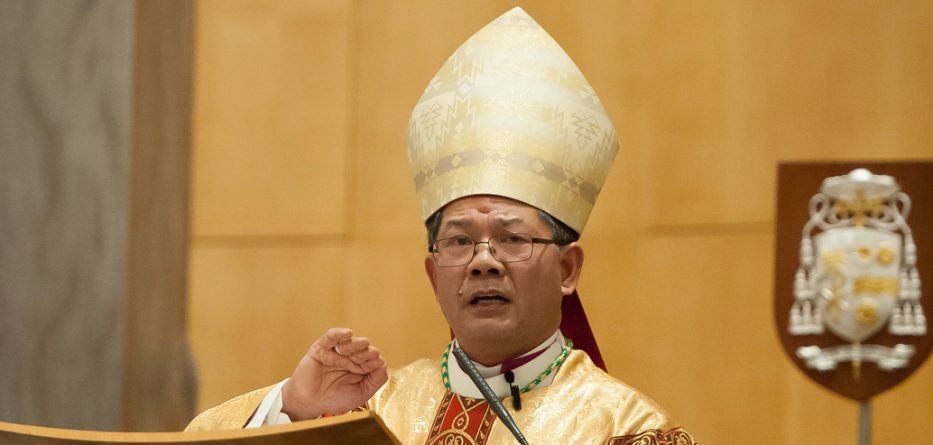Most Reverend Vincent Long Van Nguyen OFM Conv DD STL, Bishop of Parramatta
Homily from 26th Sunday in Ordinary Time, Year C at Sacred Heart Parish, Blackheath
25 September 2016
Dear friends,
A couple of months ago, I went to Papua New Guinea for the first time. What struck me was this paradox: this country is so close to Australia and yet it might as well be another planet. It is so close to us in geography and so far in terms of the disparity between their living standards and ours. I don’t mean to be paternalistic. Nevertheless, this disparity reminds me of the parable that we have just listened to. We Aussies sometimes whinge and whine about how tough life is for us. Yet the truth of the matter is that we are streets ahead of everybody else in the prosperity stakes. While the rest of the world lurches from one crisis to another, the land of Oz is still the lucky country. Compared to many of our neighbours like PNG, we are the rich man and others are like Lazarus at our gate.
While the rest of the world lurches from one crisis to another, the land of Oz is still the lucky country.
The Word of God this Sunday challenges us against our tendency towards self-centred living or individualism, complacency and indifference. The prophet Amos was scathing in his denunciation of the rich and the powerful in Israel. “Woe to the complacent in Zion!” he says of those who enjoy themselves while others suffer from hunger and despair. They are completely engrossed in their selfish concerns and enjoyments. They fail to see the needs of their brothers and sisters.
Such blindness and insensitivity are also reflected in the parable that Jesus told his disciples. The rich man was totally caught up in his own affairs. He dressed himself magnificently; he feasted every day sumptuously; he enjoyed a good life without any reference to Lazarus who longed for the crumbs that fell from his table. Then death brought about the reversal of fortunes. Lazarus was comforted in paradise while the rich man was tormented in hell.
They fail to see the needs of their brothers and sisters.
Yet the point of the parable is not about rewarding the poor and punishing the rich. Rather, it is about the sense of duty and responsibility that comes with what we have been given. Despite his riches, the rich man simply does not look beyond his own gate. He does not care; he does not recognise Lazarus as a fellow human being and his brother. He fails in his responsibility as the brother’s keeper.
Dear friends,
The Word of God is a reminder to us of our collective and personal responsibility to work for the poor, the marginalised, the rejected, the unwelcomed in our midst. We are challenged by the Gospel to confront the rampant individualism, the self-entitlement and what the Holy Father calls “the globalised indifference” that is so endemic in modern society and in the hearts of men and women.
This is what social justice is all about. It aims at bringing God’s justice to those who are poor, who are vulnerable, who are discriminated against, who are deprived of fundamental human values. And yet it begins with me, in my own environment and relationships. I need to be sensitive to the plight of others around me. Each of us has something to share with someone needing help from us. A spirit of compassion will be on the lookout, in fact will be alert to giving life in every encounter day by day.
We cannot remain unconcerned in the knowledge that a brother or a sister lies hungry or sick at our gate. We cannot rest undisturbed when there is a chasm between us and others around us. The Gospel of Jesus Christ spurs us on to seek justice for those who suffer injustice, equality for those discriminated against, hospitality for the unwelcomed, shelter for the homeless, food for the hungry and the fullness of life for all.
We cannot remain unconcerned in the knowledge that a brother or a sister lies hungry or sick at our gate.
Pope Francis is committed to the cause of the poor and the marginalised. He shows us a leadership that seeks to serve from below. He brings the image of Christ the humble servant of the poor into sharp focus. There are many of his symbolic gestures that reinforce the Gospel commitment to the least and the last. But his unashamed defence of the rights of refugees provides a pertinent lesson for us Australians. He challenges us to replace indifference with compassion, ignorance with respect and suspicion with love.
Dear friends,
We are gathered for the meal which is the Eucharist. We are fed with his body and blood; we are nourished with the fullness of life and love. But we are reminded that the flesh we eat is broken for others and the blood we drink is shed for the life of the world.
If there is hunger anywhere in the world, then our celebration of the Eucharist is somehow incomplete… In the Eucharist we receive Christ hungering in the world. He comes to us, not alone, but with the poor, the oppressed, the starving of the earth. Through him they are looking to us for help, for justice, for love expressed in action. Therefore we cannot properly receive the bread of life unless at the same time we give the bread of life to those in need wherever and whoever they may be.
In the Eucharist we receive Christ hungering in the world.
May our sharing at this table strengthen us in our commitment to be humble servants of our brothers and sisters. May we be filled with the fullness of life and the love of God endeavour to share that life and love with others.








